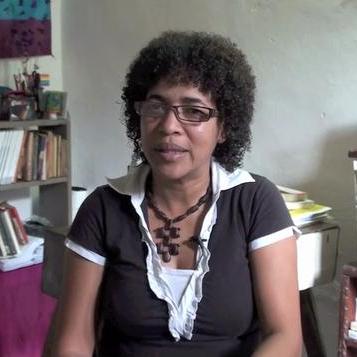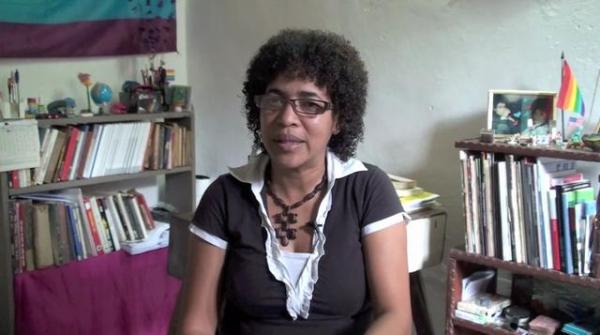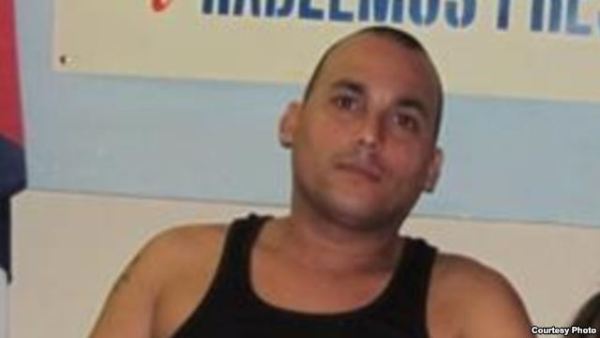News
Cuban LGBT activists cite progress, ongoing harassment
Authorities detained Leannes Imbert Acosta in Havanafor 12 hours on Sept. 11

NEW YORK– A leading Cuban LGBT rights advocate says that the country’s activists continue to suffer harassment and discrimination in spite of high profile pro-LGBT campaigns on the island.
“We are starting to understand how to organize in a more effective manner,” said Leannes Imbert Acosta, national coordinator of the Cuban LGBT Platform, an umbrella organization she co-founded in June of 12 of the island’s independent LGBT rights groups. She spoke during a panel on LGBT rights in Cuba at the Schomberg Center for Research and Black Culture in Manhattan on Saturday. “There is more societal tolerance, but discrimination still exists.”
The website Cubanet reported that two Cuban security officials detained Imbert Acosta on Sept. 11 as she left her Havana home to deliver to Mariela Castro, director of the country’s National Center for Sexual Education (CENESEX.) materials for a planned exhibit on forced labor camps to which the government sent more than 25,000 gay men and others deemed unfit for military service during the 1960s. Castro, the daughter of Cuban President Raúl Castro, has said CENESEX would conduct an investigation into these camps, known as Military Units to Aid Production or by their Spanish acronym UMAPs, but Imbert and other activists maintain that Castro has refused to work with them on this issue.
Cuba Archive, a New Jersey-based organization that documents the Cuban government’s human rights abuses, said that authorities confiscated Imbert’s materials and pressured her to cancel the planned exhibit before releasing her 12 hours later.
Castro becomes public face of Cuba’s gay rights movement
Mariela Castro has spearheaded a number of campaigns designed to prevent the spread of HIV/AIDS and promote the acceptance of LGBT people on the island over the last decade.
Castro successfully lobbied the Cuban government to begin offering free sex-reassignment surgery under the country’s national health care system in 2010. She has also spoken out in support of marriage rights for same-sex couples.
Castro appeared at the New York Public Library with Rea Carey, executive director of the National Gay and Lesbian Task Force, in May while she and other Cuban scholars visited the United States. She also met with other LGBT activists in San Francisco during the trip.
“I honestly think that the activities of Mariela Castro and the CENESEX have been positive regarding the rights of LGBT people in Cuba,” said Emilio Bejel, a Cuban-born poet who immigrated to the United States in the 1960s. The government frequently imprisoned gays and lesbians until it repealed the country’s sodomy law in 1979, but activists and others maintain that authorities continue to use public decency and assembly laws to harass them. “The difference between the situation today and just a few years ago is considerable, but there is still a refusal from the Cuban government to give full rights afforded to LGBT people.”
Achy Obejas, a lesbian Cuban American writer and journalist from Chicago who immigrated to the United States from Cuba with her family when she was six, agreed.
“Mariela’s work has been, actually I think, very good in terms of getting non-queers to talk about queers,” she said. “We never needed Mariela for us to talk about us. What she’s done is sort of made the topic more accessible, more common in places where this conversation wouldn’t be happening unless there was a queer person present or a queer problem to contend with.”
Mabel Cuesta, a lesbian Cuban-born writer who is an assistant professor in the University of Houston’s Department of Hispanic Studies, noted that police continue to raid private gay parties — Spanish filmmaker Pedro Almodóvar and French fashion designer Jean-Paul Gaultier were among the hundreds of people detained at a popular gay nightclub in Havana in 1997.
Independent LGBT rights groups and publications remain banned in Cuba, while the government requires officially sanctioned clubs to be heterosexual. Authorities arrested members of the Cuban Association of Gays and Lesbians, an independent LGBT rights group, after the government shut it down in 1997.
Ignacio Estrada Cepero, a gay HIV/AIDS activist who founded the Cuban League Against AIDS in 2003, said from Havana that those with the virus in the country continue to face discrimination. Until 1993, the Cuban government forcibly quarantined people with HIV/AIDS in state-run sanitaria. Estrada, who is positive, noted that 577 Cubans with the virus remain in prison for what he described as the crime of “pre-criminal social dangerousness.”
Observers credit the country’s condom distribution campaign and sexual education curriculum for producing one of the world’s lowest HIV infection rates. Cubans with the virus have access to free anti-retroviral drugs through the country’s health care system, but Estrada complained that these medications do not always reach those who need them.
“What we’re confronting in Cuba is a situation where people with HIV/AIDS… are living without,” he said. “We don’t have access to medication and our rights are violated.”
Jafari Allen, assistant professor of anthropology and African American studies at Yale University who has conducted research in Cuba, was also on the panel.
Virginia
Arlington LGBTQ bar Freddie’s celebrates 25th anniversary
Owner asks public to support D.C.-area gay bars

An overflowing crowd turned out Sunday night, March 1, for the 25th anniversary celebration of Freddie’s Beach Bar, the LGBTQ bar and restaurant located in the Crystal City section of Arlington, Va.
The celebration began as longtime patrons sitting at tables and at the bar ordered drinks, snacks, and full meals as several of Freddie’s well-known drag queens performed on a decorated stage.
Roland Watkins, an official with Equality NoVa, an LGBTQ advocacy organization based in the Northern Virginia areas of Arlington, Alexandria, and Fairfax County, next told the gathering about the history of Freddie’s Beach Bar and the role he said that owner Freddie Lutz has played in broadening the bar’s role into a community gathering place.
“Twenty-five years ago, opening a gay bar in Arlington was not a given,” Watkins told the crowd from the stage. “It took courage, convincing, and a deep belief that our community belongs openly, visibly, and proudly,” he said. “And that belief came from Freddie.”
Watkins and others familiar with Freddie’s noted that under Lutz’s leadership and support from his staff, Freddie’s provided support and a gathering place for LGBTQ organizations and a place where Virginia elected officials, and candidates running for public office, came to express their support for the LGBTQ community.
“Over the past 25 years, Freddie’s has become more than a bar,” Watkins said. “It has become a community maker.”
Lutz, who spoke next, said he was moved by the outpouring of support from long-time customers. “Thank you all so much for coming tonight and thank you all so much for your support over the past 25 years,” he said. “I can’t tell you how much that means to me and how much it’s kept me going.”
But Lutz then said Freddie’s, like many other D.C. area gay bars, continues to face economic hard times that he said began during the COVID pandemic. He noted that fewer customers are coming to Freddie’s in recent years, with a significant drop in patronage for his once lucrative weekend buffet brunches.
“So, I don’t want to be the daddy downer on my 25-year anniversary,” he said. “But this was actually the worst year we’ve ever had,” he added. “And I guess what I’m asking is please help us out. Not just me, but all the gay bars in the area.” He added, “I’m reaching out and I’m appealing to you not to forget the gay bars.”
Lutz received loud, prolonged applause, with many customers hugging him as he walked off the stage.

The Comings & Goings column is about sharing the professional successes of our community. We want to recognize those landing new jobs, new clients for their business, joining boards of organizations and other achievements. Please share your successes with us at [email protected].
Congratulations to Gil Pontes III on his recent appointment to the Financial Advisory Board for the City of Wilton Manors, Fla. Upon being appointed he said, “I’m honored to join the Financial Advisory Board for the City of Wilton Manors at such an important moment for our community. In my role as Executive Director of the NextGen Chamber of Commerce, I spend much of my time focused on economic growth, fiscal sustainability, and the long-term competitiveness of emerging business leaders. I look forward to bringing that perspective to Wilton Manors — helping ensure responsible stewardship of public resources while supporting a vibrant, inclusive local economy.”
Pontes is a nonprofit executive with years of development, operations, budget, management, and strategic planning experience in 501(c)(3), 501(c)(4), and political organizations. Pontes is currently executive director of NextGen, Chamber of Commerce. NextGen Chamber’s mission is to “empower emerging business leaders by generating insights, encouraging engagement, and nurturing leadership development to shape the future economy.” Prior to that he served as managing director of The Nora Project, and director of development also at The Nora Project. He has held a number of other positions including Major Gifts Officer, Thundermist Health Center, and has worked in both real estate and banking including as Business Solutions Adviser, Ironwood Financial. For three years he was a Selectman, Town of Berkley, Mass. In that role, he managed HR and general governance for town government. There were 200+ staff and 6,500 constituents. He balanced a $20,000,000 budget annually, established an Economic Development Committee, and hired the first town administrator.
Pontes earned his bachelor’s degree in political science from the University of Massachusetts, Dartmouth.
Kansas
ACLU sues Kansas over law invalidating trans residents’ IDs
A new Kansas bill requires transgender residents to have their driver’s licenses reflect their sex assigned at birth, invalidating current licenses.

Transgender people across Kansas received letters in the mail on Wednesday demanding the immediate surrender of their driver’s licenses following passage of one of the harshest transgender bathroom bans in the nation. Now the American Civil Liberties Union is filing a lawsuit to block the ban and protect transgender residents from what advocates describe as “sweeping” and “punitive” consequences.
Independent journalist Erin Reed broke the story Wednesday after lawmakers approved House Substitute for Senate Bill 244. In her reporting, Reed included a photo of the letter sent to transgender Kansans, requiring them to obtain a driver’s license that reflects their sex assigned at birth rather than the gender with which they identify.
According to the reporting, transgender Kansans must surrender their driver’s licenses and that their current credentials — regardless of expiration date — will be considered invalid upon the law’s publication. The move effectively nullifies previously issued identification documents, creating immediate uncertainty for those impacted.
House Substitute for Senate Bill 244 also stipulates that any transgender person caught driving without a valid license could face a class B misdemeanor, punishable by up to six months in jail and a $1,000 fine. That potential penalty adds a criminal dimension to what began as an administrative action. It also compounds the legal risks for transgender Kansans, as the state already requires county jails to house inmates according to sex assigned at birth — a policy that advocates say can place transgender detainees at heightened risk.
Beyond identification issues, SB 244 not only bans transgender people from using restrooms that match their gender identity in government buildings — including libraries, courthouses, state parks, hospitals, and interstate rest stops — with the possibility for criminal penalties, but also allows for what critics have described as a “bathroom bounty hunter” provision. The measure permits anyone who encounters a transgender person in a restroom — including potentially in private businesses — to sue them for large sums of money, dramatically expanding the scope of enforcement beyond government authorities.
The lawsuit challenging SB 244 was filed today in the District Court of Douglas County on behalf of anonymous plaintiffs Daniel Doe and Matthew Moe by the American Civil Liberties Union, the ACLU of Kansas, and Ballard Spahr LLP. The complaint argues that SB 244 violates the Kansas Constitution’s protections for personal autonomy, privacy, equality under the law, due process, and freedom of speech.
Additionally, the American Civil Liberties Union filed a temporary restraining order on behalf of the anonymous plaintiffs, arguing that the order — followed by a temporary injunction — is necessary to prevent the “irreparable harm” that would result from SB 244.
State Rep. Abi Boatman, a Wichita Democrat and the only transgender member of the Kansas Legislature, told the Kansas City Star on Wednesday that “persecution is the point.”
“This legislation is a direct attack on the dignity and humanity of transgender Kansans,” said Monica Bennett, legal director of the ACLU of Kansas. “It undermines our state’s strong constitutional protections against government overreach and persecution.”
“SB 244 is a cruel and craven threat to public safety all in the name of fostering fear, division, and paranoia,” said Harper Seldin, senior staff attorney for the ACLU’s LGBTQ & HIV Rights Project. “The invalidation of state-issued IDs threatens to out transgender people against their will every time they apply for a job, rent an apartment, or interact with police. Taken as a whole, SB 244 is a transparent attempt to deny transgender people autonomy over their own identities and push them out of public life altogether.”
“SB 244 presents a state-sanctioned attack on transgender people aimed at silencing, dehumanizing, and alienating Kansans whose gender identity does not conform to the state legislature’s preferences,” said Heather St. Clair, a Ballard Spahr litigator working on the case. “Ballard Spahr is committed to standing with the ACLU and the plaintiffs in fighting on behalf of transgender Kansans for a remedy against the injustices presented by SB 244, and is dedicated to protecting the constitutional rights jeopardized by this new law.”




















